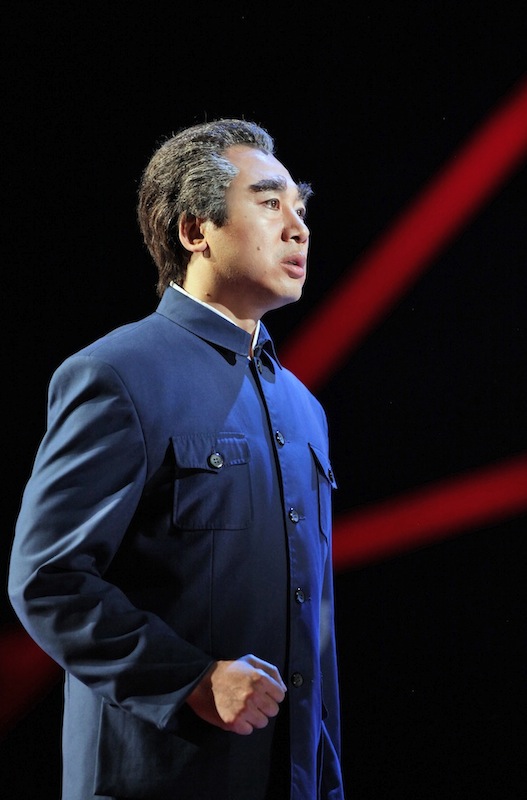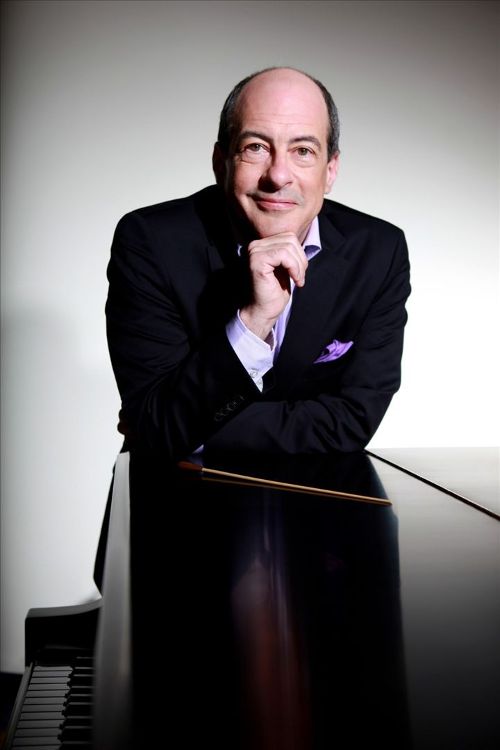HGO revisits Adams’ “Nixon in China” to mark 30th anniversary of Houston premiere

Chen-Ye Yuan is Chou En-Lai in Houston Grand Opera’s production of John Adams’ “Nixon in China.” Photo: Cory Weaver/San Francisco Opera.
When Nixon in China was heard in its world premiere at Houston Grand Opera in 1987, the air, conductor Robert Spano recalls, was filled with arguments. Was Nixon even an opera? If so, was it proper for opera to touch on current events? There was even the inside-game question of whether composer John Adams was even a minimalist anymore, what kind of music he was making, and if it could be considered a new stylistic direction.
Friday night, Spano will be in the pit, leading a Houston Grand Opera production of Nixon that will celebrate the 30th anniversary of that celebrated company premiere. In those thirty years, every question about the opera has been answered.
Nixon in China, an HGO commission, spawned the phrase “CNN opera,” which was a condescending pejorative meant to belittle the piece as nothing more than a temporary sensation in the continuous froth of the news cycle, and cable news’ particular need to chase after the obsessions of the moment. The implication was that the opera was thin, ersatz, temporary. It was also a way to dismiss the notion that it might belong in the classical tradition, for no other reason than the crimes of newness and Americanness.
By 1987, Adams was established as a neo-romantic composer, using repeated minimalist patterns as rhythmic underpinning and decoration for rich harmonic movement and long, lyrical lines. In his memoir, Hallelujah Junction: Composing an American Life, Adams describes an epiphany he had while listening to Wagner; moved by Wagner’s sincerity and desire to effect the listener’s emotions, Adams composed his breakthrough orchestral masterpiece, Harmonielehre. Nixon, with it’s judicious and stimulating influences of Wagner, Stravinsky, Bruckner, and Philip Glass, reconciled the visceral grip of minimalist techniques with the emotional range and power of romanticism, and made Adams the public face of American classical music in a way that only Aaron Copland had been previously.
Today, Nixon is firmly established as a major work in the operatic repertoire—and not just the American or modern. The opera has achieved this on its own merits. Its newness is deceptive; it is new in that it is still relatively young, but it is concerned with the culture and events of its time, and the way it uses music to create characters and express drama, is essentially no different than the operas of Mozart, Beethoven, and Verdi.
“Adams fulfills operatic expectations,” says Spano, “with a big chorus to end Act I, with arias. I’ll confess I’m a sucker for cheers, and the [grand banquet at] the end of the first act is one of the giddiest, most wonderful drunken moments! Adams really captures that alcoholic giddiness, it’s so ebullient and exhilarating to hear, and it’s also dramatically so apt.”
And the ripped from the headlines quality has turned out to be a powerful feature of the opera. President Nixon’s 1972 trip to China lives in the memories of those, now middle-aged, who saw it in television news reports, and the principals in the opera—Nixon, his wife Pat, Mao Tse-tung, Chou En-lai, Henry Kissinger—are real people, not imaginary characters or old world historic figures lost to time.
That reality comes through in the dramatic style, and the language of Alice Goodman’s libretto. Baritone Chen-Ye Yuan, who sings Chou En-lai, puts it bluntly: “Alice Goodman is a great librettist.” Spano concurs: “It’s poetic writing that is so beautiful, whose meaning is not always apparent on the surface.”
The role of Chou En-lai was originated by Sanford Sylvan, but Chen-Ye has sung it nine previous times, including the original 2004 Opera Theater of St. Louis production, which will be revived in Houston with its original director, James Robinson. He can also be heard on Colorado Opera’s live recording of the same production (Naxos).
The opera revolves around and flows through Chou to an important extent. He has the first solo line in the opera (“Your flight was smooth, I hope?”); a gorgeous, evocative aria near the end of Act I; and the final words, in haunting and mysterious music that reflects on the moral judgement of history. The words and characterization have deep resonance for Chen-Ye; “Even nowadays, the Chinese people think he was a saint. While Mao is more controversial, Chou was the people’s premiere, devoted to the Revolution and Socialism. That is so sure in his character.”
Chou “was an intelligent, elegant, gentle figure,” adds the baritone. “He was devastated by the Cultural Revolution. He wanted to protect [its victims] but he also had to do what Mao wanted him to do.”
In the opera, Chou shares a public face of platitudes and banalities with Nixon, Mao, and Kissinger, but also reveals more philosophical and moral concerns. In Act III of this tableaux-based drama, the principal characters turn inward, musing on their memories and private thoughts. Nixon and Pat sing about the poverty they endured early in their lives, Mao and his wife Chiang Ch’ing dance a foxtrot. Chou is sickened by his memories of the Cultural Revolution, finally singing what Chen-Ye describes as “a very beautiful, elegant music line, like German lieder, but the words themselves,” words about growing old and full of doubts, “are very painful. It’s not an aria like we think of, more like an epilogue, or reciting a poem.”
The poetry is of a piece with the concept and details of the opera. Goodman’s libretto sets plain language into singable verse, and the drama moves from the political spectacle of Nixon’s arrival, through a drunken banquet, an abstracted performance of the famous Chinese ballet Red Detachment of Women (choreographed originally by Mark Morris, and by Sean Curran for this production), Pat’s tour of Beijing, and finally to inward contemplation.
That inverts what is typical in opera; personal transformation. In Nixon, the drama is in how the opera’s viewpoint changes, from the public one of television and politics to the most unguarded, intimate thoughts of the characters.

Robert Spano is conducting HGO’s 30th anniversary production of “Nixon in China.”
Director Robinson says his production works through what is fundamentally a viewing experience.
“We started looking at the piece as an event, one of the most widely viewed things on television, it was a highly choreographed event. It really used telecommunications technology in big, global way. It is so much about making sure the world would see what a great gesture this was for Nixon to go to China. He was really interested in capturing this on TV and film.
“The opera has really two conflicting ideas about what history is all about and what it means. I remember as a kid viewing this on television. Everything in this production has a very specific direction for the cameras. In the world of politics on TV, there are no accidents.”
The production uses the television camera as a focus for all the action; the characters are not just on stage but on camera, playing for a global news audience. This is enhanced by video made out of “home movies” in the Smithsonian Archives—the U.S. distributed still and movie cameras to Nixon’s entourage, and encouraged everyone to document the visit from the inside. All the film was classified upon Nixon’s return, however, until it was eventually deposited at the Smithsonian.
People on TV are like ghosts, both outsized and insubstantial. Seeing them in real life, one has to affirm their reality. A common feature of most productions has Nixon descending the stairway from his plane, Spirit of ’76. The waiting dignitaries applaud, and invariably the audience in the theater applauds as well, and returns his wave. TV memories are realized in the flesh, and the distance between audience and stage collapses. The false intimacy of television becomes real intimacy.
This is fully realized in the short, powerful Third Act, which turns away from the experience of real-life spectacle to the poignant and painful banality of real life itself, replacing the artifice of public personas with private truths. Soprano Andriana Chuchman, who sings Pat, feels the character becomes “much more intimate and vulnerable. The music is much more like snippets of thoughts.
“This is my first time playing a real person,” says the Canadian soprano. “For Pat, she has her own story. It can be restricting in a sense—I can’t use my own gestures or reactions. But it’s fun. I want to have the integrity of her as a person. A lot of it has to do with the fabulous makeup and wigs and costumes from the production staff.”
Nixon is baritone Scott Hendricks in this production. Hendricks has performed an Adams opera before, singing the key role of the Captain in Death of Klinghoffer.
“It’s easy to fall into the trap of making a character like Nixon into a caricature,” says Hendricks. “Nothing really prepared me, other than experience as an acting singer on stages.”
Nixon is all too easy to lampoon, of course, but the opera avoids this by expressing fascinating and vital details through the libretto and music. On his arrival, he spits out “News, news, news,” then sings giddily about the possibilities of his trip. Then he briefly, bitterly, expresses his paranoia side and spite for anyone who might question or oppose him. There is no gimmick to this, it is the opera form revealing revealing complexity and depth as only it can.
All the singers agree on the quality of Adams’ vocal writing. “He pays special attention to the voice, the tessitura of the individual voice,” Hendricks says.
For Chuchman, the music works well with the lyric voice. “It’s melodic, with lots of fun leaps, recurring sequences and intervals. It’s a nice sing.”
Nixon in China opens 7:30 p.m., Friday, and runs through January 28. houstongrandopera.org
George Grella is a composer, critic, and independent scholar. He writes for numerous publications, including New York Classical Review, Music & Literature, and NewMusicBox. He contributed twenty entries to the Grove Dictionary of American Music and Musicians, 2nd Edition, is music editor for the Brooklyn Rail, and the author of Miles Davis’ Bitches Brew.